I live in the middle of nowhere. If I ever want to go to the city, it takes a minimum of 3 hours to get there. So whenever I head over to urban areas I like to listen to audiobooks or radio dramas. Recently I’ve been listening to a lot of Doctor Who audio dramas, so for the show’s 60th Anniversary, I figured I’d drop a big list of some of my favorite Classic Doctor Who audios, with one drama per Doctor and all tied together by the central theme of meddling with time. So enjoy.
1 – “The Massacre”
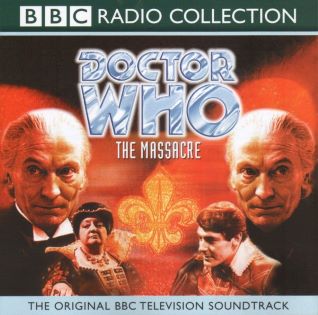
When it comes to selecting appropriate audio adventures from the 1st and 2nd Doctor’s tenure, the only proper options are the missing episodes. For those unfamiliar, these are episodes that were broadcast back when the BBC had a junking policy towards its master tapes, given its limited storage capacity and the nonexistence of home media at the time. Many of these episodes have been recovered, but several remain lost to time, with only the audio tracks surviving for people to experience.
Fortunately for many Whovians, most of the missing episodes from Hartnell’s tenure on the show are from his worst season, Season 3. During this time, Hartnell’s declining health and backstage backstabbing producer politics caused the show to suffer, and if not for a change in producers and Doctors, the show might have ended much earlier than it did.
Unfortunately for me, this means that my sample of episodes to choose from is not among Hartnell’s best. One serial in particular, “Galaxy 4”, is such a by-the-numbers Star Trek social satire (What if the ugly aliens are actually good!?), that the actors infamously rebelled against it, resulting in the insulted producer firing Maureen O’Brien for the slight. Another serial, “The Celestial Toymaker”, gave us a character that’s returning for the anniversary. But anything good this story does “The Mind Robber” does a thousand times better, to say nothing of the weird implications of Michael Gough playing a Chinese villain. And yet another serial, “The Dalek Masterplan”, is the longest and perhaps the most epic Classic Who serial of all time, at a whopping 5 and a half hours long. However, only about half of that is any good.

No, if I have to choose a missing episode story to represent the 1st Doctor, there’s really only one choice: “The Massacre”. Partly this is because it’s a wonderful story, tightly telling its tale in a compact 4 episodes. But more than that, it’s from a story type that was only ever really showcased in the Hartnell era, but which still holds a special place in the fandom’s heart: the Pure Historical.
You may have heard Whovians talk about this story format, where the only science fictional elements are the Doctor and his TARDIS, with the conflict coming entirely from mundane, human characters and the story arising from famous historical events. Every now and then you’ll even hear someone suggest they bring the format back, though I don’t think this will happen simply because, if Doctor Who has the option of using aliens, unlike every other historical drama the BBC makes, then there’s no reason for it to not play into its unique strengths. However, the fact that this format remains beloved by the fandom, and is largely confined to the Hartnell era, meant that for Hartnell’s story I had to pick it.
But why “The Massacre” and not the other many missing historicals, like “Marco Polo” or “The Myth Makers”? Well, the reason for this is the historical subject matter this story focuses on: the French Wars of Religion, and more specifically the St. Bartholomew’s Day Massacre. See, all the other Pure Historicals in Classic Who concern events and figures that people would have at least a basic familiarity with. Marco Polo, the Trojan War, the Crusades, pretty much every Briton has some knowledge on these subjects, but fewer are familiar with the Huguenots. Sure, they might have some Huguenots in their family tree, know a few basic details of Protestants and Catholics duking it out in France. But how many know that 1 in 6 Britons have Huguenot ancestry (including Jon Pertwee)? Or that the Huguenots are where we get the word refugee from? Or what even were the specific events that caused the Hugeuenots to flee France and find refuge in other countries such as England?
“The Massacre” then is unique amongst Pure Historicals for being a story about an event that is very significant to British history, but which most Britons aren’t actually aware of. As such, even though everything that happens in the story can easily be found in a history book, there still remains a sense of suspense that is absent from other PH stories, because you very likely do not know who any of these people are, if they’ll live or die, if they’re goodies or baddies, if they’re real or fictional. They’re just as unfamiliar to most audiences as the inhabitants of a distant planet, despite the fact that events like these caused massive ripplies in history.
And when it comes to that history, this story also showcases the 1st Doctor’s unique opinions on meddling with it, namely that he shouldn’t. His adamancy in this even causes a rift to form between the Doctor and his companion Steven, and though the Doctor allows himself a single act of charity before the titular massacre occurs, he refuses to take an active hand in preventing it. It’s an attitude that may seem decidedly unheroic to some audiences, but which I think reflects the 1st Doctor aptly. And as we see the consequences of the Doctor’s single act of charity, we also see the seeds of character development, as he wonders if perhaps good can come from meddling after all. Of course, to see the Doctor truly embrace this idea, he’ll have to become a new man first.
2 – “The Power of the Daleks”
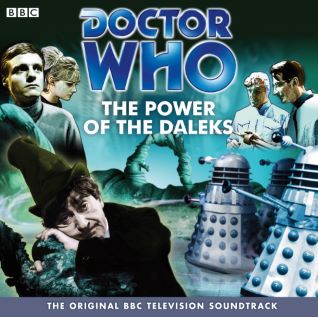
This is the story that first put the idea of this article into my head. Unlike Hartnell, whose worst stories were hit hardest by the BBC junking policy, many of Troughton’s best stories remain lost. I remember when “The Enemy of the World” and “The Web of Fear” were retrieved (and sadly some jackass pilfered one of the tapes again), and what a big deal that was. And given how amazing those stories are, I can only hope that all of Troughton’s missing episodes are fully recovered some day (and that the yetis get whoever that thieving jackass was).

Of course, such stories would never have seen the light of day if this story hadn’t been the smashing success that it was. It’s easy to forget, given how regeneration is such a core part of the Doctor Who mythology, but when they first attempted this way back in Season 4, no-one was sure if it would work. This was a huge experiment, and not just for the Doctor, but for the Daleks, not only being the first story with them to not be penned by Terry Nation, but the story that had to find a way to make the Daleks compelling again after the galaxy-spanning epic of “The Dalek Masterplan”.
What you get then is not only a story that proves the Daleks can work just fine in a small-scale story, and a story that proves the Doctor can work just fine without William Hartnell, but a story that I don’t think any “Best of Patrick Troughton” collection would be complete without. Everything that makes the 2nd Doctor great, from the Base Under Siege format to the way the Doctor throws himself into meddling, has its roots in this story. And while it’s the only 2nd Doctor story to not have his most iconic companion, Jamie McCrimmon, I think that just makes this story even more important. If Jamie had been there from the beginning, the 2nd Doctor might be like the 9th, as a Doctor who couldn’t really exist outside his dynamic with his iconic companion. But with “Power of the Daleks”, we get to see the 2nd Doctor come into his own on his own, and we know that the show is in good hands as it moves beyond its origins.
3 – “The Paradise of Death”
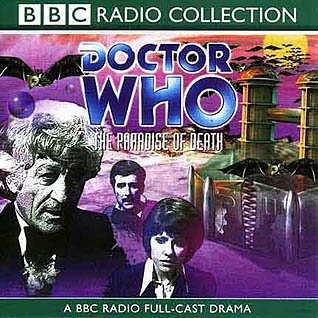
As you probably know, shortly after wrapping production on “The Time Warrior”, Jon Pertwee learned that his good friend and Doctor Who co-star Roger Delgado had tragically died. With his death and Katy Manning’s earlier departure from the show, Pertwee would admit that doing Doctor Who stopped being fun, and he would leave the show after his contract ended. Some have pointed out that this is very evident in S11 itself, with Pertwee looking more tired and old than in previous seasons, and the writer’s room slowly running out of ideas before the 3rd Doctor era ends on more of a whimper than a bang.
As such, I don’t think it’s a coincidence that, when Barry Letts met with Jon Pertwee and suggested getting the band back together for an audio adventure, they set the story right after “The Time Warrior”. Everything about “Paradise of Death” feels like the cast and crew are trying to give things another go, after their time on the show didn’t end in a way they’d have liked. And the end result is a love letter to the 3rd Doctor era.
Bridging the earlier UNIT era with later space exploration tropes, “Paradise” is chock full of callbacks and references to classic 3rd Doctor stories, and yet like Terry Pratchett, these references are of the type where you don’t need to get them to enjoy the overall plot. They simply serve as icing on the cake. So what’s at the chocolatey center of that cake? Quite simply a bunch of cast and crew having fun.
There is an overwhelming sense of fun in every moment of “Paradise of Death”, as everyone gets back into the swing of things and remembers how much they used to enjoy this. And while everyone sounds noticeably older than they did when they were on tv, the evident joy in their voices in every scene more than makes up for this.
Of course, similar to the 3rd Doctor himself, this story is sort of the odd one out when stacked amongst the other entries of this list. Sure there’s an alien invasion, and the Doctor getting involved in heroic derring-do, but there’s really not that much in the way of meddling with time. However, I still think “Paradise” is the only option that could be on this list, with it serving as a far more satisfying capstone to the 3rd Doctor’s tenure than most S11 stories.
4 – “City of Death”
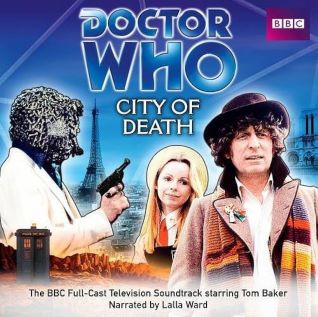
An audio adventure for the 4th Doctor is difficult to choose, simply because of the unique nature of 4’s run on the show. There are no missing episodes from his run, nor is there a sense of unjust termination like with the 6th or 7th Doctors. And while the 3rd and 5th Doctors had some sense of unfinished business with their patchier stories, the 4th Doctor’s run lasted a whopping 7 seasons, and ended on a pretty high note. So not only is there quite a lot of 4th Doctor material out there, but it seems to have served the 4th Doctor pretty well. As such, if you’re hungry for high-quality 4th Doctor stories, you don’t really have to go scrounging through spinoff material.
More than that though, Tom Baker is perhaps the actor most tied to his time as the Doctor. He was an unknown when first cast, and even after leaving the show never really escaped the shadow of it, so unlike previous Doctors he was always reluctant to come back for audio recordings, only coming to Big Finish after it had lost a lot of its luster.
No, if I’m going to choose an audio adventure to represent 4, it’s got to be from the tv soundtracks, and more specifically the one for “City of Death”. If there was a “Face of Evil” tv soundtrack release, I might have picked that one over this, but since there isn’t one, it’s got to be this classic, regarded by some as the best Classic Who story of all. It certainly had the highest ratings of any Who serial, and given the modern-day streaming landscape, it’s unlikely any future Who broadcast will beat its record. But what makes it so beloved and adored?

Well, partly it’s the Douglas Adams script. Adams, when he could be bullied into doing his job, was always in top form, and this story is no exception. But leaving aside the script editor, I think another factor to this story’s greatness has to do with its producers. The 4th Doctor era is predominantly defined by its two main producers, Philip Hinchcliffe and Graham Williams (John Nathan-Turner would of course produce 4’s last season, but that involved him very deliberately moving focus away from the Doctor), who in turn were defined mainly by horror and comedy, respectively. Obviously, these are simplistic labels, but I think the best way to describe “City of Death” is as it having a standard Hinchcliffe villain in a standard Williams story.
Philip Hinchcliffe stories tended to not simply be horror-influenced, but specifically follow the pattern of “An ancient evil that was imprisoned long ago has started to escape, but it’s still weak enough for a mortal foe like the Doctor to defeat it once and for all.” “City of Death” then takes that format and puts a distinctly Williams/Adams comedy spin on it, while also adding a bit of variety to the premise, since its ancient evil is actually at his most powerful in his temporal prison, and the Doctor can only defeat him when he succeeds in his escape plan. Also, ironically for the most anarchic Doctor, this story has him actively trying to prevent meddling in time, as he meddles to stop the ancient meddler from meddling malevolently. The end result is a story with two great tastes that taste great together, and an adventure I can’t recommend highly enough in any format.
5 – “Spare Parts”
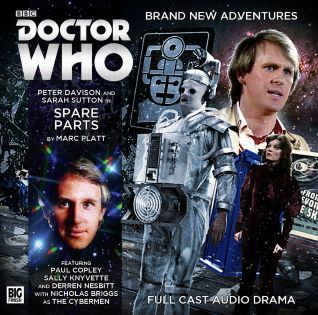
It’s easy to forget that there was once a time when Big Finish was regarded as more than, at best, a glorified pension plan for genre actors, or, at worst, a shameless cash-in of fandom nostalgia that never found a minutiae it couldn’t mine the marrow from until there was nothing but a barren husk left. But it’s true that, not so long ago, Big Finish was not only the top dog to get your Wilderness Years content from, but the producers of some genuine classics.
When looking through the 5th Doctor’s audio adventures with Big Finish, I searched countless threads and discussion forums, trying to collect a list of his best stories. But to my genuine surprise, on all these threads and lists, the same story kept showing up at the very top: “Spare Parts”. I’ll admit, I have a soft spot for the story myself (I’ve still got the CD I purchased years ago on a shelf somewhere), but I was pleasantly surprised to learn that I was not alone in my positive reception towards it. Not only would it later get incorporated into NuWho (with Marc Platt getting a story credit for “Rise of the Cybermen”/”The Age of Steel”), but it succeeded in doing what Neil Gaiman would attempt years later: making the Cybermen scary again.
Fans who complain about how the Daleks became lame once they got shiny, bright paint jobs don’t realize how good they’ve got it. If that’s the farthest the Daleks have fallen, they should count themselves lucky, because nothing can compare to the sheer depths in which Eric Saward ran the Cybermen into the ground. Oh, those of us who remember watching “Tomb of the Cybermen” on VHS as a wain weep when we remember the heights these baddies fell from, reduced to cheap tarpaulin suits and instakill weakness to gold. But in “Spare Parts”, the Cybermen become just as chilling as they were when they first showed up at that Antarctic Base.

It isn’t just the Cybermen the story does right by though, but Adric. Despite dying (a rarity for companions), the Doctor and his pals never really addressed his demise at the hand of the Cybermen (even Katarina got more of a mourning period than Adric, and she wasn’t with the TARDIS crew for nearly as long). This confrontation on Mondas though allows the Doctor to not only face his famous enemy, but his grief over Adric’s loss.
That being said, this is easily the most continuity-heavy story on this list, to the point where I honestly don’t know if you could enjoy it fully without at least having a basic idea of the events of several other Doctor Who serials. Yet despite this, I feel this story is a perfect representation of the 5th Doctor’s era, because (without too many spoilers), it’s ultimately about the Doctor failing, about trying to meddle and not succeeding. More than any other Doctor, 5’s era is defined by him trying to do the right thing, the noble thing, and the universe tearing him to shreds over it. That may sound grim, but that’s the direction Eric Saward was trying to take the show, for better or for worse. And while 5 may have gotten a few good stories out of his run, no Doctor was more thoroughly screwed over by Saward’s own meddling than our next entry.
6 – “The Holy Terror”
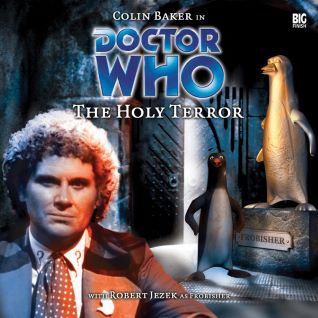
Of all the Doctors on this list, 6’s was the hardest to find a suitable audio adventure for. Initially I checked out “Slipback”, but that was trash. Then, I wanted to find a newer story with 6 and Peri in it, since Peri is the only character who got just as thoroughly screwed by Saward as 6. But while I did end up finding a story that gave Peri justice (“Peri and the Piscon Paradox”), it doesn’t really fit on this list because it’s a 6th and 5th Doctor adventure. Then I decided to try limiting myself to the Lost Stories, serials that were intended for 6’s tv run before his hiatus and cancellation. But those, uh, weren’t very good. Still better than “Slipback”, but that bar’s so low you’d need to dig a hole to drink from there. So finally I said fuck it and chose this.
Yes, I know. There are scores of 6th Doctor stories on audio. Colin Baker loves Doctor Who, and of all the Classic Doctors, 6 was the one most in need of a redemption that Big Finish were more than happy to provide. As such, there are far too many amazing BF 6 stories for me to choose from, but I have to go with this one, simply for nostalgia’s sake. See, this was my very first 6th Doctor story, ever. It holds a special place in my heart, and it’s got a talking penguin in it, obviously that’s going to make it a contender.

But more than that, I think “The Holy Terror” is an ideal choice for this list because so much of it comes across as what Eric Saward was trying to do over the course of his tenure as script editor. Saward ultimately did not have the talent to see his vision realized skillfully, but the basic idea of making Doctor Who darker and edgier while also having a comedic edge to things isn’t a bad idea in principle. It’s just an idea that would only see fruition in spinoff media.
Am I saying that the plot element in “The Holy Terror” of a “Mind Robber”-esque hack writer desperately trying to get rid of his child and churning out mediocre, cliché slop is a well-placed jab at Saward and his tenure on the show? No of course not, don’t be silly. But I am saying that that’s a fun way of looking at the plot, and could certainly give some listeners an added layer of enjoyment to things. And with an ending where the Doctor ponders his history of meddling, and sadly muses how one can never really know the consequences of one’s actions, however noble the intentions, it just drives home the key missing ingredient to 6’s tv run: heart.
7 – “Death Comes to Time”
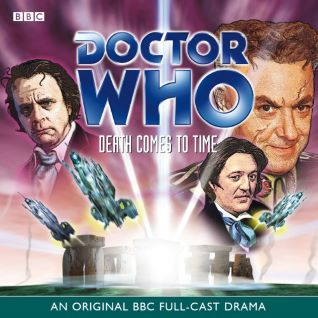
This is probably the most controversial choice on this list. Very few people enjoy “Death Comes to Time”, with noted Who critic El Sandifer outright despising it and likening it to the BBC trying to cram the Whoniverse into a Joseph Campbell archetype. Harsh words, and a valid lens to analyze the story through. However, if I may take a contradictory approach, I think a better lens to view “Death” through is simply the show itself, more specifically stories like “The Face of Evil”, which take a microscope to the idea of the Doctor’s meddling.
While I would like to think that Doctor Who has showcased a progression in its attitude towards meddling with time, the truth of the matter is that the show has always flip-flopped on its opinions throughout the years. The only consistent message it’s really showcased is the idea that if the Doctor tries to meddle too much, if he tries to not simply help out the villagers, clear out the baddies, and ride off into the sunset but instead tries to play God and bend the universe to his will, that’s when bad shit happens.
Many listeners point to the Brigadier’s appearance in this as shameless nostalgia bait or an outright deus ex machina, and yet I think it actually fits well with “Death”’s overall themes, despite it not making much sense if you aren’t already familiar with the Brigadier and UNIT, because it demonstrates the lesson the Doctor comes to learn in this story, that humanity has outgrown its need for him or any other Time Lords. The various peoples of the universe that the Time Lords have ostensibly protected are now able to decide their own destiny, without a guiding hand to steer them.
The thing is, I should honestly be pretty happy that fans hated this so much. This was intended to be the grand finale of the entire DW franchise, and if not for the fan backlash, the BBC may never have realized that people were still hungry for more Who. And I can’t really fault anyone for looking askance at “Death”, when it quite simply cannot be canon given the TV Movie and Revival Series. However, even if it’s an experiment that (quite thankfully) didn’t pan out, I am fascinated with “Death Comes to Time”, and if ever Doctor Who were to end, I can’t think of a better grand finale.



Leave a Reply